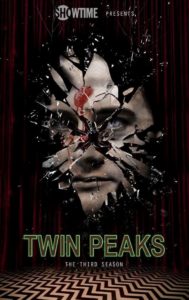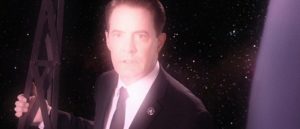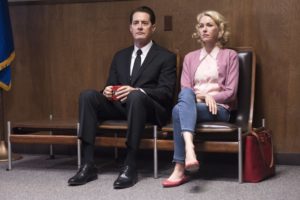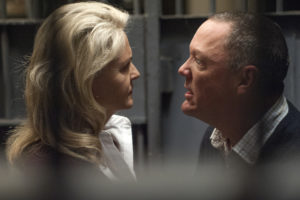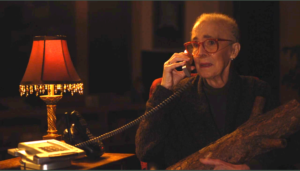By now TWIN PEAKS: THE RETURN, the Showtime shepherded, David Lynch directed follow-up to 1990-91’s TWIN PEAKS, has been analyzed from every conceivable standpoint. As of September 3, 2017, the date of the series’ concluding episode, the analyses, critiques and interpretations dedicated to it are too numerous to count. I’m not sure I have much to add (and anyway my preference, as anyone even slightly familiar with this site well knows, is for movies and television that aren’t widely covered elsewhere), but, having faithfully followed the series, I do have some thoughts.
TWIN PEAKS: THE RETURN (Trailer)
TWIN PEAKS: THE RETURN, it seems, is a definite love it or hate it program. I’m squarely in the former camp myself. The show may have been dense and inconclusive (David Lynch trademarks both), but it had a tightness and uniformity lacking from the first two seasons, which for all their positive qualities had a somewhat disjointed, made-up-as-they-went-along feel. Here David Lynch’s command is absolute, and make no mistake: this is unfiltered Lynch, with the measured pacing, unflinching violence and all-encompassing bizarrie that make up his universe. Furthermore, it’s the David Lynch of FIRE WALK WITH ME and LOST HIGHWAY, two of his most widely contested films, who was on display in TWIN PEAKS: THE RETURN, for which I couldn’t be happier.
A major component of the series’ effectiveness was the cinematography by Peter Deming, one of Lynch’s key 1990s-era collaborators. After INLAND EMPIRE, which was lensed in cheap digital format, Lynch threatened to shoot all his subsequent films similarly. I like INLAND EMPIRE, but find that its visuals, like those of other talented filmmakers who’ve become digitally besotted (that would be you, Michael Mann), are something of a drawback. It’s great to see the evocative, painterly images for which Lynch is known on display once again.
As much as I enjoyed TWIN PEAKS: THE RETURN, I recognize that it’s part of an ugly trend. Hollywood has of course been mining the everything-old-is-new again concept for years in a seemingly never-ending stream of reboots, with television—cable television in particular—standing as our last remaining beacon for original content. Yet now, with long-dead programs like WILL AND GRACE, CURB YOUR ENTHUSIASM, ROSEANNE and now TWIN PEAKS being given years-after-the-fact reboots, it seems that beacon has been officially snuffed out.
Expanding on that last point, I find that in thinking about today’s entertainment landscape what comes to mind is the Italian film industry of the 1970s and 80s. Back then moviemaking in Italy was governed by a very simple principle: to get financing a filmmaker had to answer the question “What’s this like?” One of those filmmakers was the late Lucio Fulci, who in 1979 directed ZOMBIE/ZOMBI 2, a film that was conceived as a sequel to/rip-off of DAWN OF THE DEAD. Fulci, however, brought a lot of his own to the project, creating something that will definitely never be mistaken for DAWN OF THE DEAD, nor a sequel to same.
It seems David Lynch took a similar approach with TWIN PEAKS: THE RETURN, exploring a whole new set of quirks and obsessions in the guise of a TWIN PEAKS revival. Note how little of the series actually takes place in Twin Peaks, and all the new characters, with favored Lynch cast members like Naomi Watts, Laura Dern, Harry Dean Stanton, Robert Forster, Chrysta Bell and Balthazar Getty crowding out PEAKS regulars like Sherilyn Fenn, Grace Zabriskie, Mädchen Amick and Everett McGill. Note also how the series’ most beloved character, the Kyle MacLachlan essayed Agent Cooper, is, until the final three episodes, most definitely not himself.
One surprising aspect of the new TWIN PEAKS was the all positive critical notices it received. This is in direct contrast to most of David Lynch’s films of the last quarter century, whose critical reception generally ranged from mixed to (in the cases of FIRE WALK WITH ME and LOST HIGHWAY) downright hostile. This change of heart, I believe, is due in large part to the fact that Lynch has been absent from screens for over ten years, giving reviewers ample time to realize just how special his work truly is.
In spite of the points I made above, I believe Showtime made a sound decision not to renew TWIN PEAKS: THE RETURN for another season. Think back to 1990, when TWIN PEAKS premiered: its rapturous initial reception was not dissimilar to that of THE RETURN, but that reception soured mightily in season two, resulting in an anti-David Lynch backlash that took some time to dissipate. Given that critical grumblings about TWIN PEAKS: THE RETURN have begun already (from one online critic: “Showtime probably wants to strangle David Lynch for 13 weeks of paint drying”), I expect another season would be greeted much like season two of TWIN PEAKS was received—which is to say, not very well at all.
On the already-legendary episode eight: this may indeed be the single weirdest thing David Lynch has ever done, and certainly the strangest hour of TV I’ve ever seen, a veritable experimental film in episodic televised form. Episode seventeen was nearly as crazed, with an altogether unprecedented use of superimposition and a most unexpected trip back in time to FIRE WALK WITH ME. Only David Lynch could get away with such sublime insanity.
Music has always played an important part in the Lynch-verse, and it was moved to the forefront here. That’s hardly surprising, as David Lynch has devoted much of the past decade to creating music (much of it in collaboration with TWIN PEAKS: THE RETURN cast member Chrysta Bell). The various musical acts whose performances conclude most of the episodes of TWIN PEAKS: THE RETURN are, I sense, as important to Lynch as the plot or characters.
Of the new cast members, I was most partial to Naomi Watts as the alternately bossy and seductive Janey-E, and (surprisingly) Matthew Lillard, a newbie to the Lynch-verse who fits into this absurd landscape disconcertingly well; his character is quite sympathetic, being a nice guy who seems genuinely shocked upon being hauled off to prison for a crime he has no recollection of committing, yet also quite creepy, as it’s immediately clear there’s something about him that just ain’t right. Also deserving of mention is Lynch’s longtime musical muse Chrysta Bell as FBI agent Tammy Preston, who doesn’t get a whole to do but is quite captivating nonetheless; her reactions alone are priceless.
Given how thoroughly David Lynch’s sensibilities dominate every aspect of TWIN PEAKS: THE RETURN (singer/cast member Julee Cruise has likened him to an “Emperor”), I wonder about the contributions of the show’s co-writer and executive producer Mark Frost. Frost has claimed he oftentimes did “almost all the work” on TWIN PEAKS’ original series, and seems resentful of all the attention Lynch got for it. Given that Lynch directed every episode of THE RETURN, I think the outsized attention he’s received this time around is justified, but Frost has to have exerted some influence.
Based on Frost’s past work (which includes numerous scripts for HILL STREET BLUES and the horrific suspense novels THE LIST OF SEVEN and THE SIXTH MESSIAH) his hand would appear to be most evident in episode twelve, with its revelation of clandestine FBI dealings and hints of extraterrestrial contact—which of course also brings to mind TWIN PEAKS’ most famous follow-up, a certain program containing the words “X” and “Files” in its title, a linkage that may or may not have been intentional on the parts of Lynch and Frost.
I have a partial complaint about the final episode—its ending, to be exact. The final scene, involving a most disquieting homecoming, was great; I won’t pretend to have understood what happened, but do admire the perfectly delineated sense of nightmarish apprehension Lynch creates, which concludes the series on an appropriately haunting, unsettled note (I’ll also register admiration for what a great screamer Sheryl Lee is). My problem was with an earlier scene depicting another, far more idyllic homecoming that showcases Lynch’s weakness for happy endings. There’s nothing inherently wrong with that, but the scene feels tacked-on, serving no logical, or even illogical, purpose other than to tie up a narrative strand that could have stood to be left dangling.
See more of Adam’s commentaries and reviews on David Lynch.

